Outcomes of our co-design activities informing future web services
Over the summer we ran co-design events involving over 100 participants from a variety of areas of the University. This work has given us a fresh perspective on the range of web activities undertaken across the University, and is informing our next steps as we continue our project to develop the new web publishing platform and services.
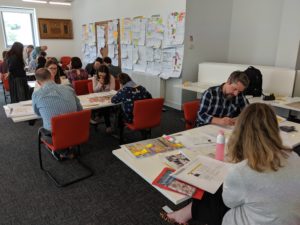 For three months, we collaborated with Priscilla Chueng-Nainby to design and run an intensive series of co-design activities. These were aimed at developing a stronger understanding of people’s needs around web publishing, and involve our users in helping shape our future services.
For three months, we collaborated with Priscilla Chueng-Nainby to design and run an intensive series of co-design activities. These were aimed at developing a stronger understanding of people’s needs around web publishing, and involve our users in helping shape our future services.
We held 14 workshops in total, across three campuses. These sessions represented all Colleges, and a diverse range of business units.
Our activities were designed to be broad and to encourage creative thinking. This is because of the intended widened scope of our future platform and services. So we needed to understand wider needs around the web generally, not just current behaviours and attitudes around EdWeb.
Key themes
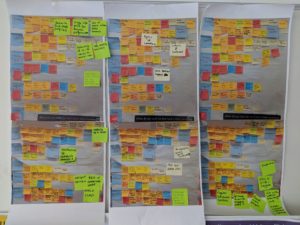 We have identified six key themes that emerged through the workshop activities in terms of people’s desires for future web services:
We have identified six key themes that emerged through the workshop activities in terms of people’s desires for future web services:
- Flexibility – to meet more bespoke needs from different areas of the University.
- Integrations – better enabling connections between other systems and the CMS.
- Simplicity – not just in the CMS but in the services and processes around it.
- Scalability – modular functionality, more reactive product roadmap, more continuous improvement.
- Collaboration – more community oriented, facilitating connections between web teams in different areas.
- Universality – a more co-ordinated approach, greater consistency in web content from different areas.
There is an interesting challenge here, because some of these desires appear to be contradictory, at least on the surface. For instance, how do we reconcile the undoubted desire for greater flexibility with the equally strong desire for simplicity and universality? It was not unusual to encounter a person calling for more flexibility one moment, before talking about the frustrations caused by inconsistencies.
Further research will be required for us to understand what is behind requests for flexibility, and how this can be reconciled with the need to maintain a high quality of web content.
Other common themes
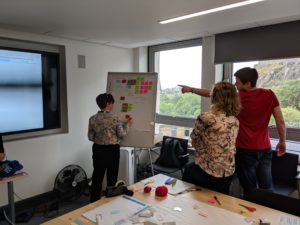 Throughout this phase of work, we asked participants to note down and affinity map their wishes for future web services. Beyond the items identified above, some other common themes emerged:
Throughout this phase of work, we asked participants to note down and affinity map their wishes for future web services. Beyond the items identified above, some other common themes emerged:
- Modularity of templates / website designs
- Improved image functionality – for example, a wider variety of sizes and positioning options; making it easier to use the asset store.
- Content ownership / governance – for example, who does what; what happens to content after a project is finished or funding runs out.
- Training to meet more specific needs – for example, training for different levels of involvement; web/design best practice.
- Secure content – for example, password-protected atoms, and password-protection that can give access for non-University people.
- Community empowerment – for example, advocacy tools for local editors; a community-driven roadmap.
- Integrations with key systems such as the degree finder and Pure.
- Enabling a wider set of uses cases – for example, academic research project websites; lab websites; commercial aspects of the business.
Persona development
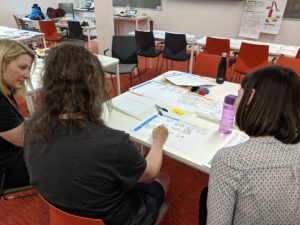 We asked participants to develop personas. Since many people in the web publishing community are familiar with the existing EdWeb personas, we used these as a starting point. But because future services will be wider in scope, we knew that new personas would have to be developed. So we also invited participants to create new personas.
We asked participants to develop personas. Since many people in the web publishing community are familiar with the existing EdWeb personas, we used these as a starting point. But because future services will be wider in scope, we knew that new personas would have to be developed. So we also invited participants to create new personas.
Through these activities, we have developed a much stronger understanding of the range of users of web services.
The existing EdWeb personas have done a good job of helping us think about users of the EdWeb content management system. But we need to consider a wider range of characters in relation to not just the content management system, but our services as a whole.
Six new core personas were developed through these worskhops:
- Aileen the academic
- Colette the comms/marketing manager
- Donald the do-it-all
- Serena the senior manager
- Terek the tech expert
- William the writer/editor
These personas are are currently in an interim state. They are heavily role-based, which made them easy for participants to identify with. But we also found that it was easy for people to slip into thinking about these personas in stereotypical ways — similar to the problem faced with demographics in personas.
Moreover, many of the personas’ characteristics actually cross-cut with each other. Our next step will be to evolve the personas further to retain the attributes that we’ve gathered, but re-shape them and make them role-agnostic.
Use cases explored
Through these workshops, we asked participants to create journey maps, then work together on role play activities, to thoroughly explore important use cases.
Workshop participants explored a wide range of use cases:
- Prospective students – for example, promoting degree programmes; understanding the relationship between School website content, central content and the degree finder.
- Academic research activities – for example, updating academic profiles; lab or research group websites.
- Teaching – for example, delivering interactive teaching materials.
- Commercial – for example, promoting veterinary services.
- Public engagement – for example, promoting concerts for the public organised by Edinburgh College of Art.
- Current students as web publishers – for example, student society websites.
Pain points
- Content ownership and governance – for example, one participant drew a journey map of the ‘vicious cycle of out-of-date content’.
- Resource – some are frustrated that there are too many editors whose skill levels vary, some of whom can “break the website” without realising. Others have too few resources to manage their web presence effectively.
- Compliance – how to ensure adherence to brand guidelines, GDPR, etc.
- Findability of content – this is particularly an issue for areas of activity less closely related to academic activities, such as commercial aspects or promoting public concerts.
- Relationship with central services – not knowing who to contact for what.
Potential service enhancements
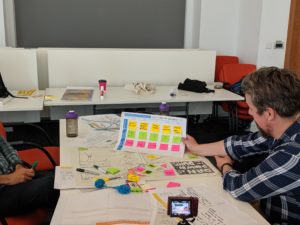 After identifying our users, use cases and existing pain points, we began to identify ways in which we might improve future web services.
After identifying our users, use cases and existing pain points, we began to identify ways in which we might improve future web services.
- Single point of entry to enable business units to express their needs, which can be triaged as appropriate.
- Different types of training to meet more specific needs — for example ‘advanced’ training or focused technical training.
- Enhanced integrations between the CMS and non-EdWeb websites to facilitate reusability of content (for example, to help cross-promote events).
- Clearer instructions for working with images, linked with templates and the style guide.
Team workshop
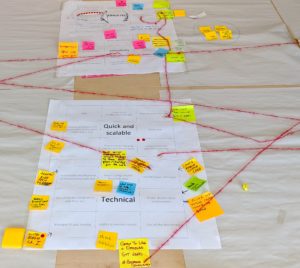 Our final step was to involve members of the Website and Communications team in a final workshop. We presented team members with synthesised versions of outputs from the previous workshops, to generate ideas for how we might meet some of the challenges described above. Among the ideas created were:
Our final step was to involve members of the Website and Communications team in a final workshop. We presented team members with synthesised versions of outputs from the previous workshops, to generate ideas for how we might meet some of the challenges described above. Among the ideas created were:
- Improving relationships with local web staff, and empowering them to understand and advocate for central services.
- Enabling collaboration between web-related staff from different areas of the University, and reaching out to help build the community.
- Enhancing content quality with automated tools built into the CMS.
- Clearer routes to services – “no nonsense”.
Thank you
If you have participated in this phase of work, thank you very much for getting involved! This has been a broad piece of discovery work, and your involvement has given us a refreshed understanding of what users of web services want and need.
We will continue to carry out user research to further develop our understanding and answer some of the questions raised during this phase of work. This will inform the minimum viable product of the new publishing platform, and our planned service enhancements and new ways of working.


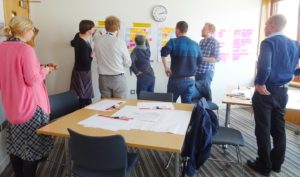
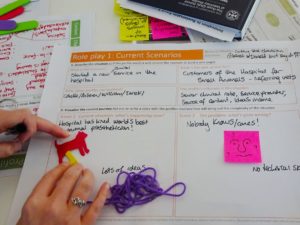
1 replies to “Outcomes of our co-design activities informing future web services”